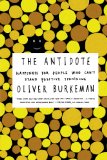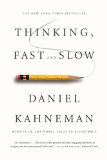Summary | Excerpt | Reading Guide | Reviews | Beyond the book | Read-Alikes | Genres & Themes | Author Bio

The Power of Thinking Without Thinking
by Malcolm GladwellComment: In his first book,
The Tipping Point, Malcolm Gladwell looked at why major
societal changes often happen suddenly and unexpectedly. In
Blink he examines the process of snap decision making: How
do we make choices in the blink of an eye, apparently without
conscious thought, and why are some people brilliant decision
makers, while others are consistently inept?
Blink combines one part popular science, one part market
research and one part self-help into a book that, if it were a
meal, would be heavy on the canapés but light on the main
course.
The basic premise is that, just as every cell in our body
apparently has all the DNA needed to create a new us, each
person has their own essential nature that is present in even
the shortest observation of that person. In the same vein,
each relationship has its essential nature that can be intuited
within a very short amount of time. Gladwell refers to
this process of observing someone or something for a short time
and drawing predictions from this observation as "thin-slicing".
We thin-slice all the time, usually unconsciously and often, but
not always, with surprising accuracy. For example, a
psychologist named Nalini Ambady asked students to rate teachers
they had not met on the basis of three 10-second soundless
videotapes of the teacher lecturing. Their ratings matched those
of the students who had had the teacher for a full semester.
Even when the video clips were cut down to 2 seconds the ratings
were remarkably similar.
In the extensive excerpt at BookBrowse you can read entertaining
anecdotes such as how a total stranger could know more about you
by spending 15 minutes in your bedroom than your friends know
about you after years, and why some doctors get sued frequently
while others never do. Then read how the British were able to
learn valuable secrets from the German's Morse code, even though
they didn't know what the code said, simply by recognizing the
individual 'fist' of the sender.
However, once one looks past the many fun stories and
conversational writing style, a lot of what Gladwell has to say
seems a little obvious and it's not entirely clear what
his thesis is. On the one hand he cites incidences where
the snap judgment proved better than the decision made with
deliberation;. on the other, he shows examples where jumping to
a conclusion proved dangerously, even fatally, wrong.
Sometimes we are shown examples of regular people who excel at
snap judgments with no formal training; other times we hear from
researchers who've spent decades honing their skills in the
research lab.
If there is a concluding thought it is that by becoming
conscious of the unconscious process by which we "thin-slice" we
can become better at making snap decisions - a useful skill for
all of us, but an essential one in some professions, such as
those that require the carrying of a gun! To quote
Gladwell, "snap judgments and first impressions can be
educated and controlled … Just as we can teach ourselves to
think logically and deliberately, we can also teach ourselves to
make better snap judgments."
![]() This review
first ran in the April 5, 2007
issue of BookBrowse Recommends.
This review
first ran in the April 5, 2007
issue of BookBrowse Recommends.

If you liked Blink, try these:

by Oliver Burkeman
Published 2013
A witty, fascinating, and counterintuitive read that turns decades of self-help advice on its head and forces us to rethink completely our attitudes toward failure, uncertainty, and death.

by Daniel Kahneman
Published 2013
Engaging the reader in a lively conversation about how we think, Thinking, Fast and Slow will transform the way you think about thinking.
Your guide toexceptional books
BookBrowse seeks out and recommends the best in contemporary fiction and nonfiction—books that not only engage and entertain but also deepen our understanding of ourselves and the world around us.